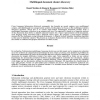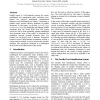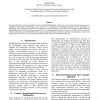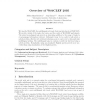101
Voted
ACL
2010
15 years 3 days ago
2010
Word Sense Disambiguation remains one of the most complex problems facing computational linguists to date. In this paper we present a system that combines evidence from a monoling...
116
click to vote
AAI
1999
1999
Multilingual Natural Language Generation for Multilingual Software: A Functional Linguistic Approach
15 years 1 months ago
In this paper we present an implemented account of multilingual linguistic resources for multilingual text generation that improves significantly on the degree of re-use of resour...
113
click to vote
CORR
2006
Springer
15 years 2 months ago
2006
Springer
We are proposing a simple, but efficient basic approach for a number of multilingual and cross-lingual language technology applications that are not limited to the usual two or th...
126
click to vote
RIAO
2004
15 years 3 months ago
2004
Cross Language Information Retrieval community has brought up search engines over multilingual corpora, and multilingual text categorization systems. In this paper, we focus on th...
139
click to vote
ACSW
2004
15 years 3 months ago
2004
Parallel corpus is a rich linguistic resource for various multilingual text management tasks, including crosslingual text retrieval, multilingual computational linguistics and mul...
101
click to vote
LREC
2008
15 years 3 months ago
2008
In this paper, we present HeiNER, the multilingual Heidelberg Named Entity Resource. HeiNER contains 1,547,586 disambiguated English Named Entities together with translations and ...
111
click to vote
LREC
2010
15 years 3 months ago
2010
This paper introduces a new lexicographic resource, the MuLeXFoR database, which aims to present word-formation processes in a multilingual environment. Morphological items repres...
LREC
2010
15 years 3 months ago
2010
The fast evolution of language technology has produced pressing needs in standardization. The multiplicity of language resources representation levels and the specialization of th...
109
click to vote
CLEF
2005
Springer
15 years 7 months ago
2005
Springer
We describe WebCLEF, the multilingual web track, that was introduced at CLEF 2005. We provide details of the tasks, the topics, and the results of WebCLEF participants. The mixed ...
124
click to vote
CLEF
2005
Springer
15 years 7 months ago
2005
Springer
We describe the objectives and organization of the CLEF 2005 ad hoc track and discuss the main characteristics of the tasks offered to test monolingual, bilingual and multilingual ...




